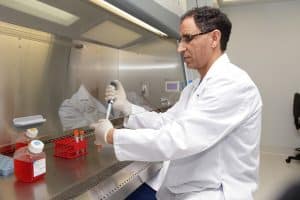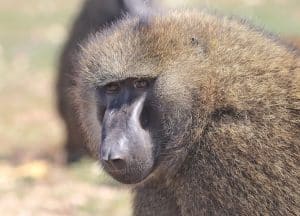
The William and Ella Owens Medical Research Foundation has awarded Texas Biomed Associate Professor Marcel Daadi, Ph.D., with a grant of more than $100,000 to test a promising FDA-approved drug for reversing age-related cognitive decline and memory deficits observed in aged baboons.
“We are truly excited about this opportunity to use aged baboons in our study because they develop human-like, age-related decline in cognitive and motor performances,” Dr. Daadi said. “With this drug, we hope to develop a therapeutic intervention to enhance the bioenergetics and function of our brain cells and improve the general health and well-being of our aged population.”
Aging is the number one risk factor for developing neurodegenerative diseases, cancer, diabetes and cardiovascular disease. Among the key underlying pathological mechanisms behind aging is a gradual deterioration of mitochondria, organelles inside cells in which the biochemical processes of respiration and energy production occur.

Over time, aging mitochondria become inefficient and are vulnerable to death. Drugs that enhance mitochondrial health may have beneficial effects on aging. Dr. Daadi used a human induced pluripotent stem cell-based assay (test) to screen for FDA-approved drugs that enhances mitochondria functions. This screen identified promising candidates that will now be tested for their efficacy to improve the neurocognitive health of our aged baboons.
“Because the baboons are quite intelligent, skilled and able to interact with a computer-based neuropsychological test similar to the one used in hospitals for humans, we are able to detect age-related cognitive decline and how a drug impacts this” Dr. Daadi explained. To measure the impact of the drug, researchers will employ interdisciplinary approaches including behavioral neuroscience and multimodal brain imaging in collaboration with the UT Health Research Imaging Institute.
“We are very honored and grateful that our project was funded by the William and Ella Owens Medical Research Foundation,” Dr. Daadi added.